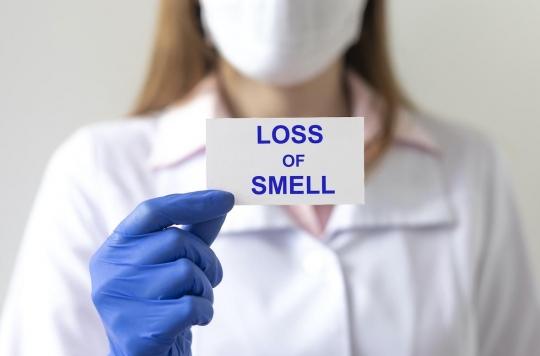Anosmia, or the loss of the sense of smell, one of the symptoms of Covid-19 infection, is a disability for which there is as yet no treatment.

- In patients infected with Covid-19, loss of smell does not lead to a stuffy nose
- The loss of smell is problematic in the kitchen where 90% of activities are related to odors
- The loss of smell is problematic in the kitchen where 90% of what we eat is related to odors
- Researchers test the effectiveness of nose washes with cortisone and olfactory rehabilitation to restore the taste of smells in those who have lost it
Very quickly, the loss of smell appeared as one of the characteristic symptoms of a Covid-19 infection. It is even a pathognomonic symptom, that is to say a clinical sign which, on its own, makes it possible to establish the diagnosis. While anosmia is common in respiratory diseases, it is caused by stuffiness in the nasal passages and a stuffy nose. In patients infected with SARS-CoV-2, the nose is not blocked.
Recently, researchers have managed to identify the mechanisms that cause anosmia. Through scans, they observed that the olfactory cleft, the part of the nose responsible for the perception of odors, becomes blocked by soft tissue swelling as well as mucus, while the rest of the patients’ sinuses are normal, explaining why the nose is not blocked. The virus uses ACE2 receptors to bind to cells and infect them, but these receptors are not expressed by olfactory neurons. These receptors are found on the surface of the sustentacular cells and their infection by the virus leads to inflammation in the olfactory cleft, explaining the swelling of the tissues which interferes with the olfactory neurons and leads to the loss of the sense of smell.
“All alone under a bell jar”
This gate of the sense of smell constitutes a real handicap. “We discover the sense of smell when we lose it”, confides to AFP Jean-Michel Maillard, president of the association Anosmia.org. All of life’s little pleasures related to smells suddenly disappear. “What I miss the most is the smell of my sons when I kiss them, the smell of my wife’s body, the scent of my dad. Anosmia cuts you off from the smells of life, it’s torture”, he testifies. One of the most problematic consequences of anosmia is in the kitchen. In addition to the loss of sensations when eating or sniffing the good smells of the pan, cooking becomes complicated since 90% of what we eat is linked to the sense of smell.
In the case of the coronavirus, the loss of smell does not usually last over time. The majority of patients recover their sense of smell in just two weeks. In other cases, the anosmia can be much longer. “When people lose their sense of smell and there is no recovery, there is a real deterioration in the quality of life and a rate of depression that is not at all negligible”, notes Alain Corré, ENT at the Rothschild Hospital-Foundation in Paris. “Being deprived of smell for a month is not a big deal. Two months is starting to get awkward. After 6 months, you are all alone, under a glass bellrelates Jean-Michel Maillard. There is a very difficult psychological dimension to live with, you have to get help.” In addition to Covid-19, other diseases can lead to a loss of smell such as nasal polyposis, chronic rhinitis, diabetes, Alzheimer’s or Parkinson’s.
Olfactory rehabilitation
For now, there is no treatment to cure anosmia. “The problem with virus-related anosmias is that often treating the viral infection has no effect on the sense of smell.”, describes Dr. Corré. Olfactory neurons have a regenerative capacity that means that most individuals who have lost their sense of smell eventually recover it. In the Parisian hospitals Rothschild and Lariboisière, a study “CovidORL” was set up to test the effectiveness of nose washes with cortisone (budesonide), associated with olfactory rehabilitation, to help recovery. Alain Corré thus advises: “choose five smells in your kitchen — that you like — such as cinnamon, thyme, bay leaf… Breathe them in twice a day, for 5 to 10 minutes, watching what you are breathing.”
.















